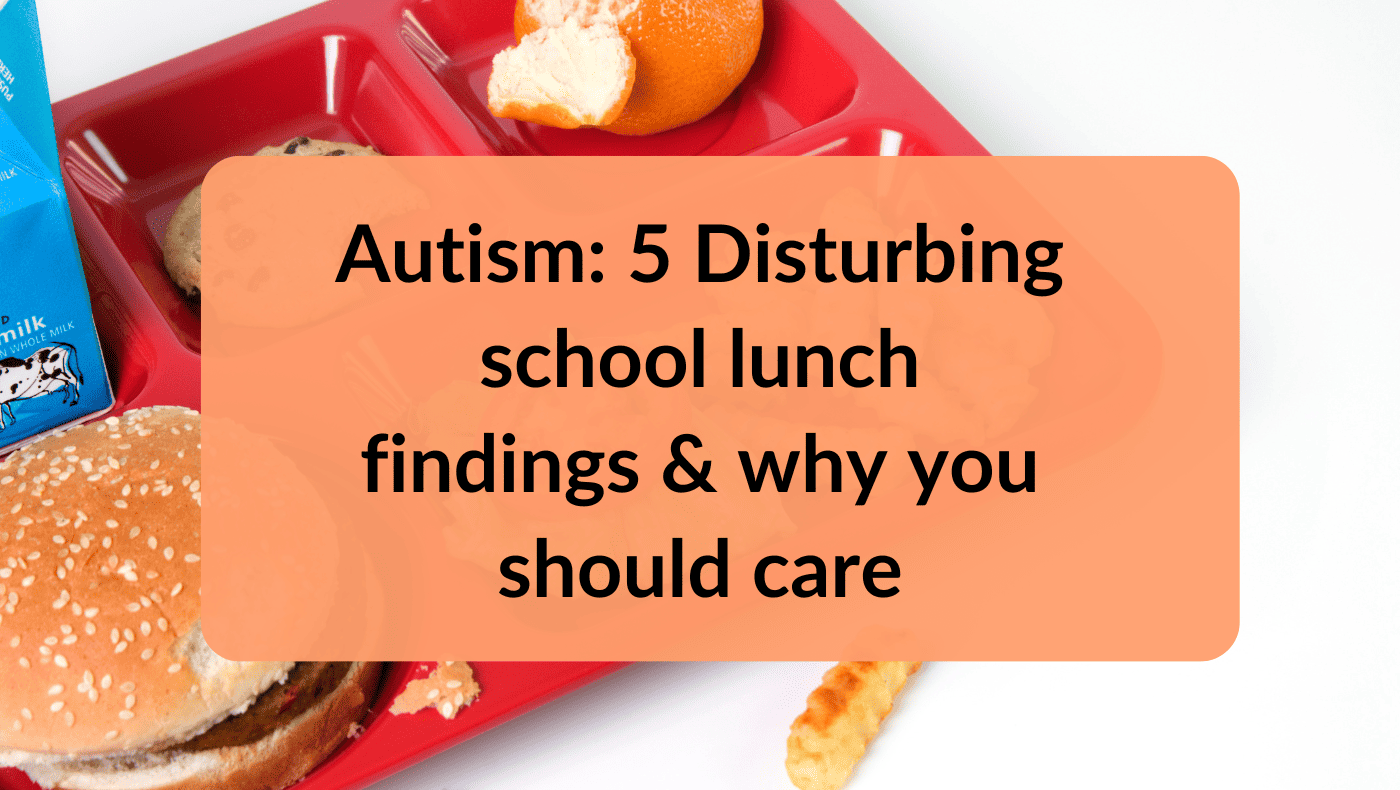Last updated on March 18th, 2025 at 07:07 am
If you have a child with an autism spectrum disorder, you are likely familiar with the importance of providing your child with healthy food. Nutrition plays a major role in a lot of the symptoms and negative behaviors you might be witnessing in your child. Did you know that the food you’re allowing schools to feed your child may cause more harm than good?
Recent studies done by Moms Across America have revealed a disturbing number of toxins, chemicals, and drugs present in children’s school lunch samples. These findings should worry any parent but especially those of you with children on the autism spectrum that are working so hard to clean things up for your child and lower their overall body burden.
Here are 5 Autism school lunch findings from recent school lunch studies and why you should care.
#1) Out of 43 school lunch samples tested 93.3% contained glyphosate
Glyphosate is a herbicide used to kill weeds and other unwanted plants in agricultural fields and gardens. It has been linked to numerous health issues such as cancer, endocrine disruption, reproductive problems, and immune system dysfunction. In fact, one study found that children exposed to glyphosate had an increased risk of developing autism spectrum disorder.
Studies have found that higher glyphosate levels can lead to a range of adverse effects on children on the autism spectrum, including but not limited to changes in behavior, impaired motor skills, and coordination, decreased verbal communication abilities, weakened ability to regulate emotions and physical sensations, poor sleep quality, and increased irritability.
Furthermore, research has indicated that glyphosate exposure may be capable of altering the microbiome – the collection of microorganisms in the digestive tract – which is essential for healthy neurological development. This dysbiosis can ultimately cause an imbalance in hormones and neurotransmitters that are required for proper brain function.
Additionally, glyphosate has been found to disrupt the body’s absorption and utilization of vital micronutrients such as magnesium, zinc, iron, and calcium which are necessary for long-term health and wellness. Disrupting these minerals from being properly absorbed by the body, can leave children at a greater risk for developing chronic illnesses or worse diseases like cancer.
Finally, glyphosate has been linked to inflammatory responses in both adults and children which can negatively impact neurological functioning by damaging neurons due to toxicity or oxidative stress. Overall, it’s clear that glyphosate exposure carries a variety of risks for individuals on the autism spectrum when compared to those who don’t come into contact with this toxic substance.
With further research needed into this area, it is important that parents do their best to limit their child’s exposure to Roundup or other herbicides containing glyphosate whenever possible. Continuing to allow your child to eat lunches that are provided by the school will continue to cause your child’s health to decline.
#2) 74% of the 43 samples contained at least 1 of 29 harmful pesticides
Children on the autism spectrum face significant adverse effects from pesticide exposure due to their unique physiology and neurological functioning. Studies have discovered a direct correlation between elevated levels of pesticides in the environment and an increased risk of autism in children. This is particularly concerning given that most pesticides are easily accessible to residential areas, making it difficult for individuals on the spectrum to avoid contact with these toxins.
The exact mechanisms behind this correlation remain unclear, however, research suggests that prenatal exposure to certain pesticides can disrupt neurological development in utero and cause structural changes in the brain which can lead to an increased risk of autism later in life. Research has also shown that even low-level, ongoing exposure to these toxins can have negative effects on neurodevelopmental processes such as learning and communication.
In addition, studies have indicated that children on the autism spectrum may be more sensitive and vulnerable to the effects of pesticide exposure than typically developing children, as they are less able to detoxify these compounds effectively due to impaired liver function. This means that even short-term exposure may result in an accumulation of toxins within their bodies which could lead to long-term health problems such as weakened immune systems and hormone imbalances.
Overall, it is clear that pesticide exposure can be incredibly detrimental for those living with autism. It is therefore essential that parents of children on the spectrum are aware of the risks associated with pesticide use so they can take appropriate steps toward protecting their children’s health and well-being.
#3) 4 Veterinary drugs and hormones were found in 9 of the 43 samples
Veterinary drugs and hormones can cause serious health issues such as hormonal imbalances in children which can lead to growth or development problems. They can also disrupt the endocrine system leading to infertility or other reproductive issues later in life.
#4) 100% (all lunches) samples contained heavy metal levels 6,293X higher than EPA maximum levels allowed in drinking water.
Analysis of 100% of lunch samples showed the presence of these dangerous substances in concentrations surpassing what is allowed in drinking water – demonstrating how even small amounts can have a cumulative effect on one’s well-being when absorbed over time. Heavy metals such as aluminum, lead, or mercury can cause neurological damage in children if ingested over extended periods of time. It is important for parents to be aware that even small amounts of heavy metals can accumulate over time leading to potential health risks for their child.
#5) The majority of the samples were low in minerals
Minerals are essential for proper growth and development in children as they help build strong bones and teeth as well as regulate body chemistry needed for energy production and metabolism. Low mineral levels can have serious implications for a child’s growth and development, including weakened bones and teeth as well as poorer body chemistry. Additionally, it could potentially lead to reduced brain function which may manifest itself in impaired learning or behavior later on in life.
It’s no surprise that school lunches contain various contaminants like pesticides, heavy metals, and hormones; however, this new data sheds light on just how pervasive these toxins really are!
Parents must take caution when selecting meals for their kids – especially those with special dietary needs – ensuring they get nutritious meals without exposing them unnecessarily to dangerous chemicals or pollutants that can have long-term consequences on their health and wellbeing. With some careful research into product ingredients sources and preparation methods, families can make healthier choices when deciding what meals will nourish their bodies minds, and hearts!
The recent findings on school lunch safety should be taken seriously by all parents; however, parents of children on the autism spectrum who are already compromised and have difficulties detoxifying these harmful toxins.
Due to the fact that our children are being exposed to all of these harmful toxins from just allowing them to eat school lunch, I think now it is even more important to start sending your child to school with their own lunch. I have done this for years and know exactly what my kids are eating every day.
A healthy diet is essential for all children and exposing your child to these toxins will continue to hinder their growth and development.
Eating organic foods whenever possible is a great way to reduce exposure to pesticides, herbicides, antibiotics, hormones, and other potentially harmful substances that may be present in conventional food products.
Additionally avoiding processed foods high in sugar, fats, and artificial flavors may also help reduce exposure to these contaminants. It’s important for you to do their due diligence when it comes to your child’s nutrition. There are so many benefits to packing your child’s school lunch. I provide you with tips on packing healthier lunches for your child in this blog post.
Taking proactive steps now will pay off tremendously down the line when it comes to your child’s overall well-being. By making sure your family eats safe nutrient-rich foods you will ensure your loved ones stay healthy and happy. Before serving any meal make sure you read labels carefully check ingredients ask questions research where food has come from how it was grown/raised/processed etc., so you know what exactly you’re feeding your family!
The Nutritional Spectrum has created The Nutritional Spectrum Kid’s Lunch Guide, which includes 12 weeks of Gluten & Dairy-free School Lunch Ideas for your child. This is just one way we help busy parents like you to make sure that your children get enough nutrients by providing them with easy alternatives that they will love as well.
Additional Resources:
- The nutritional benefits of packing your child’s healthy school lunches at home
- Five tips you can use when packing your child’s lunch





0 Comments